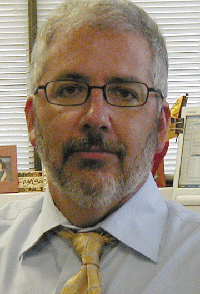Joshua Fogelson discusses the challenges facing Jewish philanthropy amid the economic crisis and after Madoff
By MORDECAI SPECKTOR
Joshua Fogelson, CEO of the Minneapolis Jewish Federation for past 11 years, has announced that he will take a new position as executive director of strategic development at the American Jewish Joint Distribution Committee (JDC).
Although “the Joint” — as the relief arm of the North American Jewish community is known to Jews in many remnant communities around the world — is headquartered in New York City, Fogelson will work from here.
“While we are saddened by Joshua’s impending departure, we are proud that he will have the opportunity to contribute to the Jewish people on the national and international levels while continuing to live with his family in Minneapolis,” said Kris MacDonald, president of the Federation’s board of directors, in a statement sent to the American Jewish World last week.
Fogelson will continue to serve in his current position until Sept. 1, which will allow the Federation to launch a national search process for a new top executive.
The statement noted that Fogelson has helped the Federation “establish a strong infrastructure to ensure a vibrant community for the future. Under his leadership, the Minneapolis Jewish community has adopted a national reputation for warmth, innovation and remarkable volunteerism.”
In a conversation with the Jewish World this week, Fogelson said that he has been a “strong and active supporter of the work of the Joint Distribution Committee for many years.” The Federation CEO mentioned that he spent a sabbatical in Israel four years ago, spending time with directors of various JDC programs and “learning more about the work they do serving the most vulnerable populations in Israel.”
 Joshua Fogelson (Photo: AJW Archive)
Joshua Fogelson (Photo: AJW Archive)
In the current economic downturn, which has been compounded by personal and foundation losses in the Jewish community from the Bernie Madoff investment scam, all Jewish communal agencies have faced budget challenges.
Fogelson said that the Federation had “its most successful campaign ever” in 2008, raising more than $16 million. The 2009 figure was down about $2 million; and Fogelson expects another “significant drop” in 2010.
Madoff — whose representatives recruited Jewish investors at Oak Ridge Country Club in Hopkins — had “a greater influence in Minneapolis than in most Jewish communities, but the economic decline was mirrored elsewhere,” Fogelson noted.
Smaller incomes and shrunken portfolios have contributed to a “lessened sense of security,” in financial terms, for many donors, he explained. “Feeling secure — for yourself, for your parents, for your kids — is really an essential quality,” before a person can think about helping others.
Regarding the deleterious effect locally from the disintegration of the Madoff investment firm, Fogelson said that the Federation was “extraordinarily appreciative” that all donors have fulfilled their pledges to the 2008 and 2009 fundraising campaigns.
However, the “precipitous decline” in the value of assets managed by the Federation has forced the organization to do some belt-tightening. Fogelson said that there have been three rounds of staff layoffs, beginning around Dec. 11, 2008, when Madoff was led away in handcuffs. The second round took place about this time last year.
The administrative budget is down 22 percent; the staff count is down 26 percent, from 35 to 26 employees, according to Fogelson, who said that the cuts have been across the board.
In cost-cutting at the top, the positions of chief operating officer and marketing director, which were held by Brian Herstig and Sue Freeman, respectively, were recently eliminated.
The Federation’s beneficiary agents, as well as donors, have been apprised of the developing budget situation. That fact was evident in an e-mail this week from Bet Shalom Congregation in Minnetonka, which discussed the financial challenges facing the synagogue.
Steven Snyder, Bet Shalom’s president, wrote: “The financial crisis still affects many families and our community as a whole. The Minneapolis Jewish Federation, which supports many worthy causes both in our local community and in Israel, has been especially hard-hit by the Madoff scandal as well as decreases in donations. The Federation has informed us that our grant, which has generously supported our Religious School, will again be reduced significantly next year. This will mark the third consecutive year of decline. The magnitude is substantial with our grant declining by nearly $130,000 per year over this three-year period. While we continue to be grateful for whatever funding is available from the Federation, we now know that we can no longer rely on this funding to balance our budget as we have in years past.”
Informed of this e-mail message, Fogelson said that beneficiary agencies have been told to plan for a 25 percent decrease in funding for the 2011 fiscal year. Regarding the Bet Shalom e-mail, which he hadn’t seen, Fogelson said that allocations to the three Reform congregational religious schools — Bet Shalom, Temple Israel and Shir Tikvah — and to the Talmud Torah of Minneapolis have been reduced based on a formula that involves “contact hours,” or student class hours, to arrive at a percentage that each school gets from the pool of Federation funds.
In view of the Federation’s rather grim financial situation, Fogelson sounded an upbeat note about the current campaign that is winding up in June. He said that the campaign is finishing with “much more positive energy,” and that “it’s impossible to say what the trend will be.” He mentioned that Tom Grossman, the incoming campaign chair, has had considerable experience in this area of the Federation. Also, Jerry Ribnick, the Federation’s president-elect, will take the top leadership spot on Aug. 11.
(American Jewish World, 5.14.10)









 Joshua Fogelson (Photo: AJW Archive)
Joshua Fogelson (Photo: AJW Archive)









